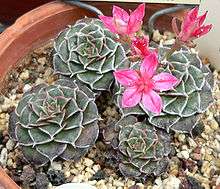Graptopetalum bellum
| Graptopetalum | |
|---|---|
 | |
| Scientific classification | |
| Kingdom: | Plantae |
| (unranked): | Angiosperms |
| (unranked): | Eudicots |
| (unranked): | Core eudicots |
| Order: | Saxifragales |
| Family: | Crassulaceae |
| Genus: | Graptopetalum |
| Species: | G. bellum |
| Binomial name | |
| Graptopetalum bellum | |
| Synonyms | |
|
Tacitus bellus (Moran & J. Meyrán) D. R. Hunt, 1979 | |
Graptopetalum bellum, also known as Tacitus bellus, was discovered by Alfred Lau in 1972 in northern Mexico, in the states of Chihuahua and Sonora, at an altitude of 1,460 m (4,800 ft).[1]
It is native to rocky terrain with moderate sun exposure.
Description
Perennial Succulent plant slowly clustering. The rosettes are up to 10 cm in diameter almost flat to the ground. Leaves are glabrous, approximately triangular, 25mm long, grey or bronze color.
Flowers appear from May to July. At the top of a 10cm inflorescence, the flowers are over 2.5 cm, deep pink to red. The individual flowers are 5 petalled, star-shaped and have dark pink stamens and white anthers.
Cultivation

Graptopetalum bellum is cultivated as an ornamental plant. This species requires more shade than the others of the family, as it is found near cliffs in the wild.
It needs a soil light and porous with good drainage. Fertilize only during the growing season, diluted to half on the recommended rate. Use fertilizer for cactus or succulent plants.
It requires low temperature for flowering in spring : at least one month at 15° C or less. It can survive a short period at -5°C, if totally dry. Do not water, or only enough to avoid shrivelling. Be careful to prevent rotting, especially in winter by low temperature or humid air.
The tightly-packed rosettes are attractive to mealy bugs.
The plant is propagated by division of offshoots, rooting of individual leaves and seed.
Bibliography
- "Botanica. The Illustrated AZ of over 10000 garden plants and how to cultivate them", pp. 410-411. Könemann, 2004. ISBN 3-8331-1253-0
References
- ↑ "Botanica. The Illustrated AZ of over 10000 garden plants and how to cultivate them", pp. 410-411. Könemann, 2004. ISBN 3-8331-1253-0
External links
- (French) photos on www.AIAPS.org
| Wikimedia Commons has media related to Graptopetalum bellum. |